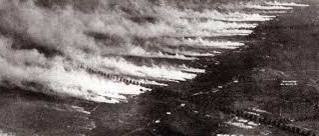Wilfred Owen: Dulce Et Decorum Est
Posted on 14th April 2021
Born in the small market town of Oswestry on the border of England and Wales into a solid middle-class family that espoused the traditional values of sobriety, hard work and patriotism the young Wilfred Owen immersed himself in his Welsh heritage especially the stories of the Bards and from an early age he expressed his desire to be a poet.
Owen was resident in Southern France where he had taken a teaching post when war was declared but unlike Brooke and Sassoon, he displayed no great desire to become involved. Indeed, it seemed as if the war was occurring in some far-away place and had passed him by, and it wasn’t until late October 1915, that he at last out of a sense of guilt returned to England to enlist for Officer training in the First Artists Rifles.

Commissioned as a Lieutenant he spent the first year of his service in England where he came to like the feel of his uniform and certainly the respect that seemed to come with it.
He was sent to France on 31 December 1916, but he had little time with which to dwell upon his new surroundings for within the week he had been transferred to the front-line fully experiencing its rich panoply of horrors – the constant shelling, the rat-tat-tat of the machine gun, the fear of the ever-present sniper and the dread of poison gas.
The brutality of it all and the fact that there were people out there who wanted to kill him came as a profound shock. It was all a little too much for the dream-like Owen who began composing the first of the more than 650 letters he was to write home to his mother complaining of the filth and dreariness of it all and of the contempt he had for the dullards under his command whom he described as unimaginative lumps. Indeed, the difference in attitude towards the common soldier between the middle-class Owen and the more aristocratic Sassoon was stark.
Having had more than one brush with death in April 1917, Owen was blown high into the air by a trench mortar which left him with severe concussion. Badly shaken he was diagnosed as suffering from shellshock and evacuated back to England where he found himself at Craiglockhart at the same time as Siegfried Sassoon. The two men quickly became close friends spending long nights together discussing poetry and literature during which time Sassoon who Owen admired greatly was unstinting in his praise encouraging him to write more than ever. In fact, almost all of the poetry we now remember him for was written in the fifteen months of life he had remaining to him.
His shellshock meant that he could have completed his military service in England and despite Sassoon threatening him with violence if he did so he volunteered to return to the Western Front to be with his men arriving in July 1918 just in time to participate in the Allied push towards final victory. On 4 November 1918, he was leading his men in a crossing of the Sambre-Oise Canal when he was shot and killed.
On 11 November, as the Church bells in England rang out at the announcement of the Armistice and people took to the streets to celebrate the end of the war Wilfred Owen’s parents received a knock on the door and the telegram informing them that their only son had been killed in action a week earlier. In 1919, in recognition of the great courage and endeavour he displayed in leading his men in a series of actions the previous autumn he was posthumously awarded the Military Cross.
Wilfred Owen is acknowledged by many to have been the greatest of the war poets more adroit and technically gifted but also more adventurous in his use of language experimenting with rhyme and vowel sounds to recreate the intense suffering of the common soldier often with a simplicity of language that reflected the simple sense of duty upon which they had entered the fight and endured its torments.
Dulce Et Decorum Est was published posthumously in 1920 but had been written three years earlier while he had been at Craiglockhart. It his ode to the effects of poison gas for Owen though he never doubted he was fighting for a just cause and was not traumatised by war in the manner of Sassoon was no less sensitive to its horrors.
Dulce Et Decorum Est
Bent double, like old beggars under sacks’
Knock-kneed, coughing like old hags we cursed through the sludge,
Till on the haunting flares we turned our backs,
And towards our distant rest began to trudge.
Men marched asleep. Many had lost their boots,
But limped on, blood-shot. All went lame, all blind,
Drunk with fatigue, deaf even to hoots
Of gas-shells dropping softly behind.
Gas! Gas! Quick boys! – an ecstasy of fumbling
Fitting the clumsy helmets just in time,
But someone still was yelling out at stumbling
And floundering like a man in fire or lime –
Dim through the misty panes and thick green light,
As under a green sea, I saw him drowning.
In all my dreams before my helpless sight
He plunges at me, guttering, choking, drowning.
If in some smothering dreams, you too could pace
Behind the wagon that we flung him in,
And watch the white eyes writhing in his face
His hanging face, like a devil’s sick of sin,
If you could hear, at every jolt, the blood
Come gargling from the froth-corrupted lungs
Bitter as the cud
Of vile, incurable sores on innocent tongues –
My friend, you would not tell with such high zest
To children ardent for some desperate glory,
The old lie: Dulce et decorum est
Pro patria mori.
Share this post:





